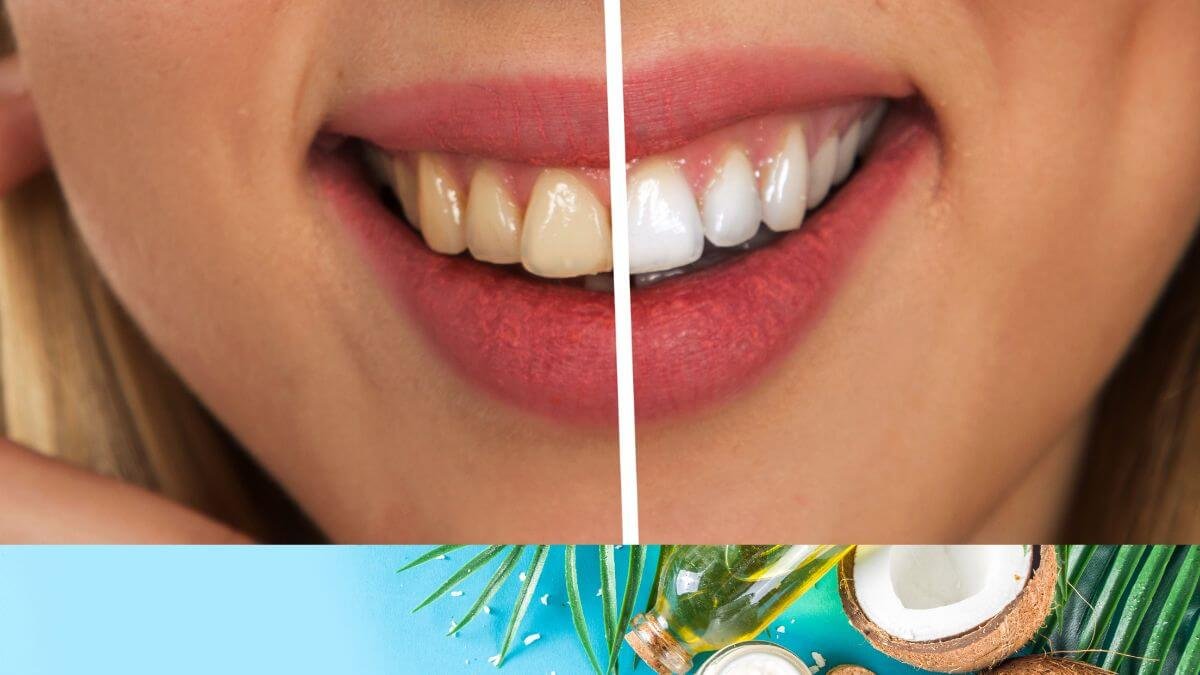Getting Started: Does Coconut Oil Whiten Teeth?
If you’re reading this article, chances are you’ve heard the buzz surrounding coconut oil as a natural remedy for a wide variety of health and beauty concerns. From promoting glowing skin to improving digestive health, coconut oil is hailed as a miracle product. But one of the most popular claims surrounding coconut oil is its ability to whiten teeth. Is this just another trend, or does it actually work?
Discover our natural products store: SALE SUPRA
Discover the power of PRODENTIM & PROVADENT
In this comprehensive guide, we’ll explore the potential benefits and drawbacks of using coconut oil to brighten your smile. I’ll dive deep into the science behind coconut oil and teeth whitening, share my personal experiences, and give you actionable tips on how to incorporate it into your oral care routine. By the end, you’ll have a better understanding of whether coconut oil can truly help whiten your teeth, and if it’s right for you. Does Coconut Oil Whiten Teeth?
Does coconut oil whiten teeth naturally?

Yes, coconut oil can help whiten teeth by removing surface stains and reducing plaque buildup. Its antimicrobial properties fight bacteria, leading to cleaner teeth and a brighter smile over time.
The Natural Appeal of Coconut Oil for Teeth Whitening
Coconut oil has been used for centuries in various cultures, particularly in Ayurvedic practices. Its versatility and benefits are often undersold, especially when it comes to oral health. The idea of using coconut oil for teeth whitening is rooted in its natural ability to cleanse, purify, and refresh, offering an all-natural alternative to more abrasive or chemical-based teeth-whitening methods. Does Coconut Oil Whiten Teeth?
But why is coconut oil considered a viable option for teeth whitening? Let’s take a closer look at some of its beneficial properties that could make it effective: Does Coconut Oil Whiten Teeth
1. Antimicrobial Properties
Coconut oil contains lauric acid, a powerful fatty acid with well-documented antimicrobial properties. This means it can help to eliminate the harmful bacteria that contribute to plaque buildup on your teeth, which in turn leads to tooth discoloration. By reducing the bacteria in your mouth, coconut oil can improve the overall health of your gums and teeth, while making them appear whiter.
2. Gentle and Non-Abrasive
Unlike traditional whitening products, which often use harsh chemicals or abrasive ingredients, coconut oil is gentle on your teeth and gums. It doesn’t strip away enamel or irritate your mouth, making it a safer long-term solution for people looking to maintain a whiter smile. This makes coconut oil teeth whitening an appealing option for those with sensitive teeth or gums. Does Coconut Oil Whiten Teeth?
3. Helps with Plaque and Tartar
Plaque and tartar are some of the main culprits when it comes to tooth discoloration. Over time, plaque can harden and turn into tartar, making it more difficult to remove. By using coconut oil regularly, you can reduce the formation of plaque, which may contribute to a whiter and healthier-looking smile.

The Science Behind Coconut Oil Pulling and Teeth Whitening
Now that we understand some of the basic reasons why coconut oil could help whiten teeth, let’s dive deeper into the science behind it. Specifically, the practice of oil pulling, which involves swishing oil around in your mouth, has gained significant attention as a natural way to improve oral hygiene.Does Coconut Oil Whiten Teeth
1. How Oil Pulling Works
Oil pulling is an ancient Ayurvedic practice where oil—typically coconut oil—is swished around in the mouth for an extended period (usually between 10-20 minutes). The idea is that the oil binds to bacteria and other harmful microorganisms in the mouth, “pulling” them out. Once the oil is spat out, you’re left with a cleaner, fresher mouth. Does Coconut Oil Whiten Teeth?
The key to its whitening effect lies in its ability to remove bacteria that contribute to plaque and staining. Coconut oil’s lauric acid binds to these bacteria and helps reduce plaque buildup on the teeth, leading to whiter teeth over time. Does Coconut Oil Whiten Teeth
2. How Long Does It Take to See Results?
While some users claim to notice a difference in just a few days, it’s important to be patient. The whitening effects of coconut oil will typically be more gradual compared to more intensive whitening products, but they are also safer and gentler. Consistency is crucial—stick with it for a few weeks, and you’ll likely start to see results, especially if combined with regular brushing and flossing.

How to Use Coconut Oil for Teeth Whitening
If you’ve decided to give coconut oil a try as a natural teeth-whitening solution, here are some simple methods you can follow to incorporate it into your routine. Does Coconut Oil Whiten Teeth?
1. Oil Pulling: The Method
- Step 1: Start with one tablespoon of organic, unrefined coconut oil. You can easily find this at most health food stores.
- Step 2: Put the oil in your mouth and begin swishing it around. Be sure to move the oil gently through your teeth, and allow it to coat all areas of your mouth. Don’t rush through it—aim for about 10-20 minutes. If you’re new to oil pulling, start with 5-10 minutes to avoid jaw fatigue.
- Step 3: Spit the oil into a trash can (not the sink, as it may clog pipes) after you’re done. Rinse your mouth with warm water.
- Step 4: Brush your teeth as usual with fluoride toothpaste to remove any remaining oil and plaque.
2. Using Coconut Oil with Toothpaste: Does Coconut Oil Whiten Teeth?
If you’re not quite ready for the full oil pulling method, you can simply add a small amount of coconut oil to your regular toothpaste. This will give you the benefits of the oil without the extended swishing time. Apply a pea-sized amount of coconut oil to your toothbrush, add your regular toothpaste, and brush as normal.
The Benefits of Coconut Oil for Teeth Whitening
Besides its potential for whitening teeth, there are several additional benefits to using coconut oil as part of your oral care routine. These benefits go beyond just appearance and are essential for maintaining overall oral health. Does Coconut Oil Whiten Teeth?
1. Improved Gum Health
Coconut oil’s antimicrobial properties don’t just benefit your teeth—they also help maintain healthy gums. By reducing harmful bacteria in the mouth, coconut oil can prevent issues like gingivitis and gum disease, which can also contribute to tooth discoloration.
2. Helps Prevent Cavities
Since coconut oil has natural antibacterial properties, it can help reduce the formation of cavities. By removing the bacteria that cause plaque buildup, oil pulling can reduce the chances of cavities forming and keep your teeth healthier in the long term.
3. Natural Fresh Breath
If you struggle with bad breath, coconut oil can help freshen your mouth naturally. Swishing the oil in your mouth may also reduce the sulfur compounds responsible for unpleasant breath, leaving your mouth feeling clean and fresh. Does Coconut Oil Whiten Teeth?

The Final Takeaway
So, does coconut oil whiten teeth? While it may not produce immediate results like chemical-based teeth-whitening treatments, it can indeed help brighten your smile naturally over time. The key to its effectiveness lies in its ability to reduce plaque buildup, remove bacteria, and gently whiten teeth without harsh chemicals. Does Coconut Oil Whiten Teeth?
If you’re looking for a safe, chemical-free alternative to traditional teeth-whitening methods, coconut oil might just be the perfect solution. Incorporating oil pulling into your daily oral care routine could offer you long-term benefits for both the appearance and health of your teeth.
Discover our natural products store: SALE SUPRA
Discover the power of PRODENTIM & PROVADENT
Remember, consistency is key! If you want to see noticeable results, stick with it for a few weeks and don’t forget to brush and floss regularly for the best results. Does Coconut Oil Whiten Teeth?

FAQ – Frequently Asked Questions
How often should I use coconut oil to whiten my teeth?
Oil pulling with coconut oil can be done 3-4 times a week for best results. Overuse may cause jaw fatigue.
Can I whiten my teeth with coconut oil if I have sensitive gums?
Yes, coconut oil is gentle and non-abrasive, making it a good option for people with sensitive gums.
How long does it take to see results with coconut oil for teeth whitening?
You may begin to notice results in as little as 1-2 weeks, but for lasting results, consistency is key.
Does coconut oil pull stains from coffee or tobacco use?
Coconut oil can help remove some surface stains, but it may not be as effective for deep-set stains caused by coffee, tea, or smoking.
Can I use coconut oil instead of toothpaste for teeth whitening?
While coconut oil can support whitening, it should not replace toothpaste. It’s best used as a supplement to your regular oral hygiene routine.
What type of coconut oil is best for teeth whitening?
Choose organic, virgin coconut oil, as it’s the purest form with the most beneficial properties.
“READY TO TRY COCONUT OIL FOR WHITER TEETH? START YOUR OIL PULLING ROUTINE TODAY AND SEE THE DIFFERENCE FOR YOURSELF!”

I’m an economist with 15 years of experience in strategic planning and a lifelong passion for wellness and natural living. As a self-learner, I created Herbalife Balance to share insights on healthy eating, mindful habits, and an active lifestyle. Tennis enthusiast and nature lover, I believe in balance as a path to well-being. Through this blog, I help others live healthier, more conscious lives.









